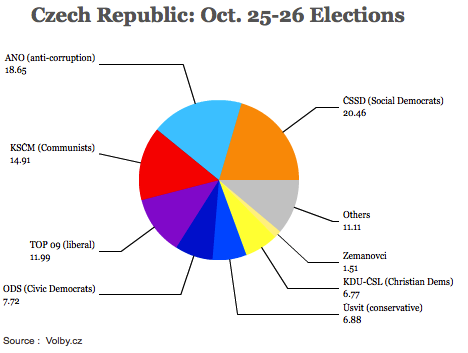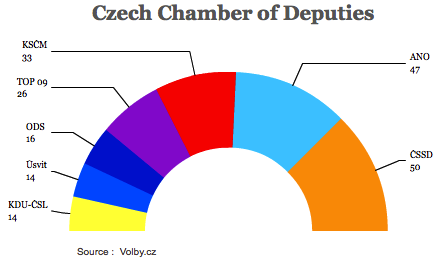In September, voters in some of Europe’s most economically stable countries (Germany, Austria and even Norway) happily turned out to support their incumbent governments. But in October, the Czech Republic’s election demonstrates that most of Europe remains under incredible social, economic and political stress.![]()
Czech voters selected members to the lower house of the Czech parliament between two days of voting on Friday and today. The result is a fragmented mess — it’s the most fractured election result since the May 2012 Greek parliamentary election, which resulted in a hung parliament and necessitated a second set of elections in Greece just a month later.
Here are the results:
Seven different parties — ranging from free-market liberals to communists to political neophytes — won enough votes to gain seats in the 200-member Poslanecká sněmovna (the Chamber of Deputies), but it’s not clear who will be able to form a government. Voters clearly rejected the previous center-right government’s approach to austerity and budget discipline, but split over what they want to replace it. Turnout fell below 60% for the first time in over a decade.
In purely political terms, the result gives even more power to Czech president Miloš Zeman (pictured above), who came to office after winning the country’s first direct presidential election in January. On the list of ‘winners’ and ‘losers’ in this weekend’s election, perhaps no one is a greater winner than Zeman, who is entitled to appoint the prime minister and therefore, will shape the first steps in the coalition negotiations.
Since taking office, Zeman has pushed to empower the Czech presidency at the expense of the Czech parliament. After the country’s center-right government fell earlier this summer, Zeman appointed Jiří Rusnok as his hand-picked technocratic prime minister, but Rusnok’s (and Zeman’s) inability to win a vote of confidence led to this weekend’s snap elections. Rusnok has served as a caretaker prime minister for the past three months, and he could wind up serving quite a while longer if no governing coalition can be formed.
The center-left Česká strana sociálně demokratická (ČSSD, Czech Social Democratic Party) technically won the election — but just barely, and with far less support than polls showed just a month ago. Despite winning more votes than any other party, the Social Democrats won just one out of every five votes, and it’s the party’s worst result in two decades. It’s not necessarily clear that the party’s leader, former finance minister Bohuslav Sobotka, will even have the chance to form a government. There’s simply no credible case that the Social Democrats have a mandate for much of anything.
Though Zeman, a Social Democratic prime minister between 1998 and 2002, broke away from the Social Democrats only in 2007, the party remains divided over the extent to which it wants to associate with Zeman now that he holds the Czech presidency. What’s certain is that the poor result will weaken Sobotka, who leads the anti-Zeman wing of the party. That means Zeman could bypass Sobotka and appoint a friendlier Social Democrat as prime minister, such as deputy leader Michal Hašek or perhaps Jan Mládek, who was widely tipped to become the next finance minister.
The real winner in today’s election is the Akce nespokojených občanů (ANO, Action of Dissatisfied Citizens), founded in 2011 by millionaire Andrej Babiš, which nearly overtook the Social Democrats in terms of support — they will hold just three fewer seats than the Social Democrats in the new Chamber of Deputies. Babiš is one of the wealthiest businessmen in the Czech Republic, and he’s led a ‘pox-on-all-your-houses’ campaign that rejects the mainstream Czech political elite as corrupt and dishonest. Babiš owns founded Agrofert, originally a food processing and agricultural company, but now a conglomerate that’s the fourth-largest business in the Czech Republic. Though his platform is relatively nebulous, he’s called for reforms to reduce corruption and end immunity for politicians from prosecution.
Think of Babiš as a cross between former Italian prime minister Silvio Berlusconi and Georgian prime minister Bidzina Ivanishvili, perhaps, and think of ANO as a more business-friendly version of Beppe Grillo’s Italian protest group, the Five Star Movement. Given Babiš’s recent effort to buy a top Czech media company, the comparisons to Berlusconi have become particularly sharp:
A Czech tabloid recently nicknamed Andrej Babis, the new star on the Czech political scene, “Babisconi.” But, when compared with Italy’s Silvio Berlusconi, he quips: “I have no interest whatsoever in underaged girls.”
In third place is the Komunistická strana Čech a Moravy (KSČM, Communist Party of Bohemia and Moravia), which won about 15% of the vote, the party’s second-best result since the fall of the Soviet Union. The party is the heir to the old Communist Party of Czechoslovakia, which governed the country from 1968 until 1990 as a Soviet-aligned, one-party state. Though the Communists have moderated their approach somewhat in the 21st century, and though they were expected to participate in a Social Democratic-led government, the party remains unapologetically communist (unlike other former eastern far-left parties, such as Die Linke in Germany, which espouse a more moderate form of democratic socialism). Given that the base of the Czech Communists was once older, rural voters, its comeback today says much about the economic despair in the Czech Republic these days.
Though the background to this weekend’s election is fairly complex, today’s vote followed the collapse earlier this summer of the previous center-right government and the resignation of former prime minister Petr Nečas. His fall involved a slew of corruption, bribery and illegal surveillance charges, and a somewhat steamy love triangle — Nečas’s chief of staff Jana Nagyova was spying on Nečas’s wife (Nečas and Nagyova have since married, perhaps to shield both of them from being compelled to testify against one another).
Nečas’s government, which took power in 2010, was already incredibly unpopular after introducing a host of sales tax and income tax increases and budget cuts. While Nečas succeeded in lowering the Czech budget deficit (the 2013 deficit will be just 2.8%), the country is struggling with recession and GDP is expected to contract by 1% this year.
The liberal Tradice Odpovědnost Prosperita 09 or ‘TOP 09′ (Tradition Responsibility Prosperity 09) emerged with the strongest performance among the parties previously in government. Its leader, former foreign minister Karel Schwarzenberg, an aristocratic Moravian nobleman, surprised everyone when he emerged as the second-place winner in the January 2013 presidential election (though he subsequently lost the runoff to Zeman). Schwarzenberg formed TOP 09 in 2009, and in many ways TOP 09 was the ANO of the previous election — a new, good-government, business-friendly party. But Schwarzenberg’s personal popularity wasn’t enough to lift the party in the parliamentary elections, and it won just 12% of the vote.
Nečas’s own party, the Občanská demokratická strana (ODS, Civic Democratic Party), suffered a historic defeat, winning just 7.75% of the vote.
Ironically, though Zeman will benefit from the lack of electoral clarity, his own party, the Strana Práv Občanů – Zemanovci (SPOZ, Party of Civil Rights — Zemanovci) won just 1.5% of the vote and won’t hold any seats in the new Chamber of Deputies.
Here’s a look at the number of seats each party was allocated:
Where does that leave a potential new government?
Sobotka had hoped to win enough seats to form a minority government, with the outside support of the Czech Communists. But together, they’ll hold only 83 seats, well short of an absolute majority:
Social Democrats (50) + Czech Communists (33) = 83 seats (17 short of a majority)
The previous government included TOP 09 and the Civic Democrats, and Úsvit přímé demokracie (the optimistically named ‘Dawn of Direct Democracy’) is comprised of the remnants of what used to be Věci veřejné (VV, Public Affairs), which was a part of the Nečas government until it imploded in 2012. Dawn, whose leader is Tomio Okamura, a Czech-Japanese businessman and senator, ran a populist, conservative, anti-corruption campaign not incredibly dissimilar to ANO’s campaign.
But the center-right has an almost impossible path. A fourth center-right party, Křesťanská a demokratická unie – Československá strana lidová (KDU–ČSL, Christian Democratic Union – Czechoslovak People’s Party), will return to the Chamber of Deputies after failing to surpass the 5% electoral hurdle in 2010, but even a four-way center-right coalition wouldn’t have enough votes to form a government:
TOP 09 (26) + Civic Democrats (16) + Dawn (14) = 56 seats (44 short of a majority)
TOP 09 (26) + Civic Democrats (16) + Dawn (14) + Christian Democrats (14) = 70 seats (30 short of a majority)
None of the parties wants to enter into government with Babiš, so the likeliest result is some form of ‘grand coalition’ of Social Democrats and the fractured center-right. Though Sobotka continues to rule out any coalition with TOP 09 or the Civic Democrats, it’s hard to imagine that the Social Democrats could bring together the Czech Communists into any ‘grand coalition’ with the two remaining center-right parties, though it’s at least an arithmetical possibility:
Social Democrats (50) + Czech Communists (33) + Dawn (14) + Christian Democrats (14) = 111 seats (11-seat majority)
If the Social Democrats become more amenable to a coalition with Babiš — though it’s hard to see how Babiš would suddenly cozy up to the Social Democrats after such a harsh campaign — they could easily form a minority government, and they would need just three votes from the Czech Communists or from within the center-right parties to govern on an issue-by-issue basis. Together, ANO and the Social Democrats could also easily form a majority with any of the remaining center-right parties:
Social Democrats (50) + ANO (47) = 97 seats (three short of a majority)
Social Democrats (50) + ANO (47) + Dawn (14) = 111 seats (11-seat majority)
Social Democrats (50) + ANO (47) + Christian Democrats (14) = 111 seats (11-seat majority)
Without ANO, however, the Social Democrats would have to turn to TOP 09 and two of the three remaining conservative parties. At best, it would be an unwieldy four-party coalition, and the Social Democratic deputies would comprise a minority within their own government. That’s hardly a recipe for a confidant, strong government:
Social Democrats (50) + TOP 09 (26) + Christian Democrats (14) + Dawn (14) = 104 seats (four-seat majority)
Social Democrats (50) + TOP 09 (26) + Civic Democrats (16) + Christian Democrats (14) = 106 seats (six-seat majority)
Social Democrats (50) + TOP 09 (26) + Civic Democrats (16) + Christian Democrats (14) + Úsvit (14) = 120 seats (20-seat majority)
One final (and unlikely) option is for ANO to lead a broad center-right coalition that includes TOP 09 and any two of the three remaining center-right parties. Not only would the center-right have to become comfortable joining a coalition with Babiš, they would have to become comfortable with making Babiš prime minister. Zeman, whose favorite outcome is probably a friendly Social Democratic-led government, would likely exhaust every effort to prevent it, too. Again, it would require four parties to agree on a governing agenda, and even then, the government wouldn’t have an incredibly wide margin for error:
ANO (47) + TOP 09 (26) + Christian Democrats (14) + Úsvit (14) = 101 seats (one-seat majority)



One thought on “Czech election results: a fractured and uncertain Chamber of Deputies”